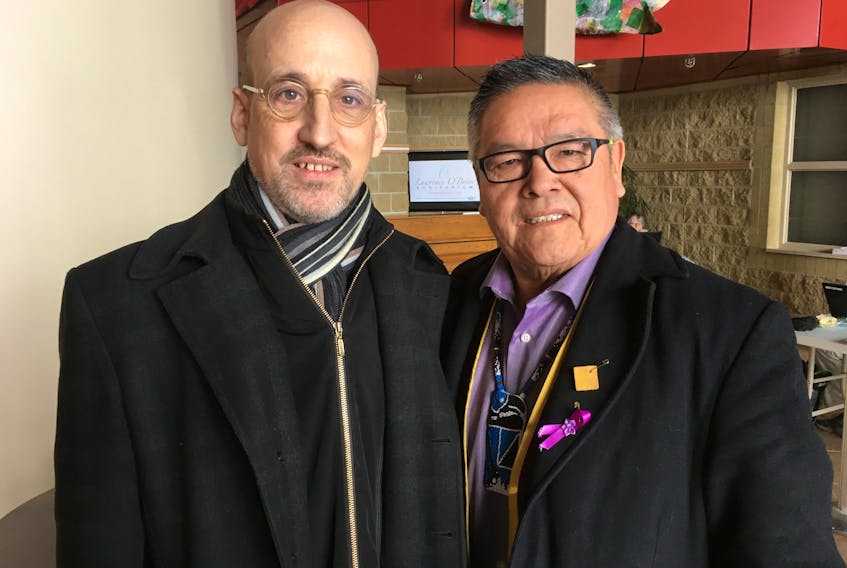In the corner of a stage, in a large auditorium in Happy Valley-Goose Bay, two speakers of the Innu language – albeit different dialects – struggled to communicate the full frustrations of Chief Jean-Charles Piétacho of the Conseil des Innu d’Ekuanitshit, and by extension those of his community, with the Muskrat Falls project.
The Innu of Ekuanitshit describe their traditional territory covering a large expanse, reaching from what is now labelled southern Quebec along the St. Lawrence River, and into Labrador. The asserted area reaches the Churchill River, and Piétacho testified he and his people feel strongly, even now, they were never properly consulted on the latest hydroelectric development there.
The dam at Muskrat Falls is already built, he expressed in testimony, making it clear he does not know what this inquiry will be able to contribute for his people, who were most concerned about the potential for harm to caribou populations, although they have other concerns.
In the case of hydroelectric developments on the Romaine River by Hydro-Québec, he said the Innu of Ekuanitshit were consulted over a period of at least two years, with far greater financial support for review of the proposed projects than was experienced with Nalcor Energy’s Muskrat Falls project.
Piétacho was prompted for general thoughts.
“All of this right now … it’s all about money,” he said through a translator. “All they think of this land is money. But to us, it’s our heritage.”
The position of Piétacho on the consultations that occurred stands opposite that of project proponent Nalcor Energy, responsible for assuring the legal duty to consult is met, as well as from the Government of Newfoundland and Labrador and the Government of Canada, which supported the work of their Joint Review Panel, tasked with environmental assessment for the project. Piétacho expressed similar disappointment with that process and consultations at the time of that review.

He testified one of the main issues throughout has been consideration for all Innu. It’s something he believes should have been expressed in the quality, earnestness and meaningfulness of consultations.
He advocated fiercely before the inquiry again for respect for his Indigenous language, describing notices of the planned Muskrat Falls project and successive permits being sent to the Innu of Ekuanitshit in English only. The Innu of Ekuanitshit have French speakers, along with Innu, but not English. Everything they received required professional translation when it was sent in English, he said.
“They would talk about deadlines of 30 days that were impossible to meet,” his lawyer, David Schulze of Dionne Schulze, said at one point, translating a comment made by Piétacho to him in French.
Inquiry co-counsel Barry Learmonth and Justice Richard LeBlanc noted at least some of the English documentation being used at the inquiry had been provided by Piétacho’s lawyer, who had also provided courtesy French-language translations. Learmonth and LeBlanc did acknowledge a lack of translation of all documents in evidence into the Innu language, making reference to the inquiry’s limited resources.
There were no questions from lawyers for other parties with standing. There was no lawyer present for the Innu Nation, beneficiaries of the New Dawn agreements.
“The panels, every time they come here, (we) say (we) use the land and we will always be here,” Piétacho’s translator offered at one point. “That’s what he’s saying.”
More of Piétacho’s own story is recounted in an affidavit filed to the Federal Court in May 2012. There, translated into English, he relays his mother’s stories of when she was a child, and travelled to Sheshatshiu with her family. Piétacho said his generation was subject to forced attendance at residential schools and there were fewer such family trips between areas now in Quebec and areas in Labrador. But they did not end, he said.
In 1979, a quarter of the land claimed in negotiations with the federal government involving the Conseil Atikamekw-Montagnais (with the Conseil des Innu d’Ekuanitshit participating there) was in Labrador. A land use study specific to the Innu of Ekuanitshit found their land use reached Winokapaw Lake, at the Churchill River.
In 1980, according to the affidavit, the Government of Quebec accepted a starting point for negotiation with the Innu of Ekuanitshit, but the Government of Newfoundland and Labrador never has accepted their claim. The government of the more easterly province had not participated in any negotiation efforts, Piétacho stated.
“We never stopped asserting our rights and title in Labrador,” the affidavit reads.
“All they think of this land is money. But to us, it’s our heritage.” — Chief Jean-Charles Piétacho
Piétacho, whose father and grandfather also served as chief, was part of the group of hundreds of people who protested at Churchill Falls in March 1998, when then-premiers Brian Tobin (Newfoundland and Labrador) and Lucien Bouchard (Quebec) were to meet regarding a hydroelectric development on the lower Churchill River. The crowd, including Innu people from many areas, was upset by the lack of consultation.
They blocked the road, and prevented the premiers’ cars from reaching their planned destination from the airport. When the premiers took to a helicopter, the affidavit states, the protest moved to filling the community hall where the premiers’ news conference was to take place. The venue was changed, and they managed to track down the new location, to confront the premiers and ask why Innu people were not directly involved.
“That day, which I will never forget, was the day I was proudest to be Innu: we were all assembled and united to defend our ancestors’ land,” Piétacho stated.
He has sworn that in the following decade, there was no consultation with the Innu of Ekuanitshit, while in 2008, the provincial government announced an agreement in principle with the Innu nation for the New Dawn, Tshash Petapen.
In the first phase of the inquiry, the commissioner heard in detail about Indigenous consultations from the perspective of Nalcor Energy and the provincial government in the lead-up to the project being approved. Piétacho’s evidence will be considered by LeBlanc alongside that earlier testimony.
(NOTE: This is an updated version, to correct error in spelling.)
RELATED









